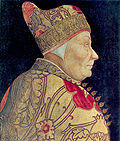Foscari (noble family)
The Foscari (with an emphasis on the first syllable) were an important patrician family in the Republic of Venice .
history
The first evidence of the family dates back to around the year 1000, and before 1311 the family belonged to the patriciate of Venice . They had owned estates near Treviso since the 12th century . The basis for the wealth of the family, however, was a fiefdom over the Greek island of Limnos , which it held from 1207 to 1276. Within Venice they were assigned to the 16 “new doge families” (case nuove ducali) , the “ducal houses”, although of course they were not hereditary, but only in the respective person of the elective duke. In 1331 Nicolò Foscari was made Count of Zelarino and Noventa by John of Bohemia , which contradicted the prohibition of title and feudal acceptance in the Venetian patriciate.

The Doge Francesco Foscari (1373-1457), the longest reigning Doge (1423-1457) of the Maritime Republic, is considered to be the most important representative of the sex. Under his government, Venice expanded territorially, but was also almost permanently in a state of war, which devoured huge sums of money. His son and only descendant Jacopo Foscari was exiled to Crete for improper use of privileges due to his father's position ; he and his father are main characters in the play The Two Foscari (1821, "The Two Foscari") by Lord Byron and the opera I due Foscari (1844) by Giuseppe Verdi based on it .

In the later history of Venice, the clergy and ecclesiastical judge Piero Foscari came to the fore in the 15th century, as did the brothers Nicolò and Alvise Foscari, who built the Villa Foscari (also "La Malcontenta" between 1550 and 1560) by the architect Andrea Palladio. called), which is one of the most important models of Palladianism . It fell into disrepair in the 19th century and was finally sold, but was bought back in 1973 by the architect and architectural historian Prof. Antonio ("Tonci") Conte Foscari (* 1938).
The ambassador and scholar Francesco Foscari (1704–1794) and the naval captain Piero Foscari (1865–1923), who was involved in an East Africa expedition and a fascist member of the Italian Senate, also became known.
At the end of the 19th century, Count Piero Foscari married the Austrian Countess Elisabeth Widmann-Rezzonico, the heiress of the Paternion rule in Carinthia, which is still owned by his family branch to this day.
buildings
- The Palazzo Ca 'Foscari was built by the Doge Francesco Foscari . The University of Venice is named Università Ca'Foscari di Venezia after this building .
- The Palazzo Foscari Contarini was built in the 16th century by the Foscari family.
- The brothers Nicolò and Alvise Foscari had the Villa Foscari on the Brenta Canal built for the family of Andrea Palladio in the 16th century , one of the most important Palladian villas (also known as “La Malcontenta”), which can be visited today, but also by the Foscari family is still inhabited.
literature
- Volker Reinhardt (Ed.): The great families of Italy (= Kröner's pocket edition . Volume 485). Kröner, Stuttgart 1992, ISBN 3-520-48501-X .



